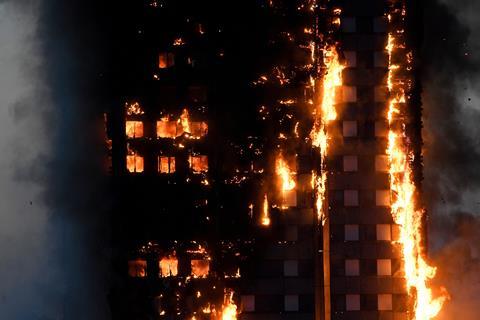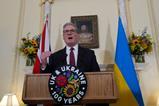Today’s scathing report into the Grenfell Tower fire has blamed “dishonest” companies and failures by successive governments. George Pitcher says Christians can’t only mourn the 72 lost lives. We must also repent of our own blindness to the suffering of the poor, both at Grenfell and in the English Channel

This is an utterly shaming week in the history of our nation. Indeed, it is shaming for a western European civilisation that is often claimed to be built on Christian foundations.
Two desperately tragic events – one from seven years ago, just revealed in all its scandalous horror in a published report, and the other occurring in real time this week – stand in cold condemnation of our carelessness and moral abandon.
The bald facts are these: The inferno that swept through London’s Grenfell Tower criminally dangerous flats in 2017 killed 72 people. And, this week, 12 desperate human beings, including six children and a pregnant woman, drowned in the English Channel, seeking asylum in the UK.
We should mourn them all. But we should also be very angry and wholly shamed. Because what all these victims share in common – plus all those who are bereaved of them – is that they were poor. Not just economically poor, though that is particularly true of Grenfell, but also poor in the scriptural sense that they were vulnerable, marginalised, dispossessed. And we, the comfortable and safe and established, failed them.
So, shame on us. We knew the Grenfell report would be bad. But this? It’s a grotesque litany of condemnation of the rich and powerful.
It may be a distasteful word to use in the circumstances, but the acts of those responsible for the disaster are breathtaking. The manufacturers of the tower’s cladding products were “by far the largest contributor” to the blaze, engaged in “systematic dishonesty” and (God help us) deployed “deliberate and sustained strategies” to make their products appear safe.
Arconic, the maker of the tower’s cladding panels, “deliberately concealed” the safety risk. Two other companies “misled”. Successive governments since the early 90s missed “many opportunities” to address the risks of flammable cladding, particularly the coalition government of 2010, which cut regulation of these materials.
The hugely wealthy Royal Borough of Kensington and Chelsea had a “persistent indifference to fire safety”. And guess what? “Particularly the safety of vulnerable people.” Let’s always remember the pained expressions of the pearl-clutchers that the council fielded in the wake of the disaster.
We should mourn them all. But we should also be very angry and wholly shamed
Finally, though there is no finality to this, the London Fire Brigade, had an “unfounded assumption” that Grenfell’s conflagration could not happen. The high-handed complacency towards the lower socio-economic orders pervades these findings.
The report’s unspoken demand of us is never to forget. But how could we? The taped phone calls to emergency services from the tower that night and the testimonies of the survivors will haunt us. We don’t only pray that justice will be done for them; we must demand that justice is seen to be done.
Turning, albeit reluctantly, to the grim new toll of deaths in the Channel, we see a common pattern with Grenfell. These people don’t seem to matter. We’re inured to their suffering.
It’s no longer enough to blame frozen-hearted people smugglers, though it is axiomatic that they are to blame. Co-operation in security with France is no longer a solution. It simply drives the boats to attempt more dangerous routes.
France’s interior minister, Gerald Darmanin, nailed it this week when he spoke at the harbour in Boulogne. He said Britain has a deliberately loosely regulated job market, that acts like a magnet, drawing young Eritreans, determined Sudanese, Afghans, Syrians and Iraqis to this coastline, convinced that if they can just make it across this last, short stretch of water - or even half way across - they’ll end up in a country where they can find work, even without the right paperwork.
Darmanin called yet again for a new migrant treaty with Britain. I apologise (though not much) for indulging in sarcasm: If only there was some sort of pan-European federation through which we could tackle this collectively?
The gospel injunction is that the poor are always with us. For many years, that fell discomfitingly on my ears. It sounds like that privileged complacency again, especially when the Nazarene adds: “You only have me for a short while.”
But, as his mother says, listen to him. He tells us that there will always be the vulnerable and dispossessed among us. We’re called to serve them.
From Grenfell in west London to the cold waters of the Channel, we’re failing to do so. It’s wholly insufficient, ultimately, to point the finger of blame at other people, however enraged we are by the by the evidence that emerges from boards of inquiry. The responsibility lies with all of us, not only those we put in charge of looking after the poor.
We need to channel (pun intended) our anger. We seem to be blind to the plight of the poor, who are always among us. We’re just not seeing the people who need us most. But, for Christ’s sake, we’d better start looking.





































1 Reader's comment